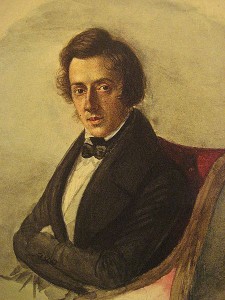Chopin, Życzenie A Maiden’s Wish, Op. 74, No. 1
 Frederic Chopin (1810-1849) wrote almost exclusively for the piano. It was an unusual choice for a composer at the time when success was achieved primarily by creating large scale works—operas and symphonies. Chopin wrote two piano concertos early in his career, but most of his works are short character pieces.
Frederic Chopin (1810-1849) wrote almost exclusively for the piano. It was an unusual choice for a composer at the time when success was achieved primarily by creating large scale works—operas and symphonies. Chopin wrote two piano concertos early in his career, but most of his works are short character pieces.
Character pieces were well-suited to the Parisian salons, small venues in aristocratic homes as opposed to the concert hall. Chopin excelled at this genre, composing nocturnes, ballades, barcarolles, stand-alone “preludes,” and dance forms from his native Poland (Mazurkas and Polonaises). No composer has a more prominent place in the piano repertoire today.
The salon scene also found another favorite genre in song: the German Lied or French mélodie. We don’t generally associate Chopin with vocal music, but nineteen Polish songs (Pieśni) survive. Seventeen of them were published posthumously as Opus 74 although they were written over a span of 20 years. They are set to Polish texts written primarily by poets Chopin knew personally.
The Chopin songs exhibit his usual skills as a melodist, although many of them have a folk-like simplicity quite different from his elaborate melodies for piano. Liszt made piano transcriptions of six of the songs.
Several recordings can be found, but I recommend one with Aleksandra Kurzak (featured in this video) and Mariusz Kwiecien accompanied by Nelson Goerner (Fryderyk Chopin Institute 2009).
Were I a sun, so high in Heav’n out-beaming,
Only on One should my radiance be streaming;
Not upon forest, not upon meadow
Would I dispel the shadow:
Into thy window yonder brightly gleaming,
Only for One all day I’d be beaming.Were I a birdling, blithesomely winging,
Only for One would I ever be singing!
Not for the forest, not for the meadow,
Sporting in sun and shadow:
Under thy window, thy window swinging,
Only for One my song I’d be singing!
Text by Stefan Witwicki; English translation by Theodore Baker (1897)



